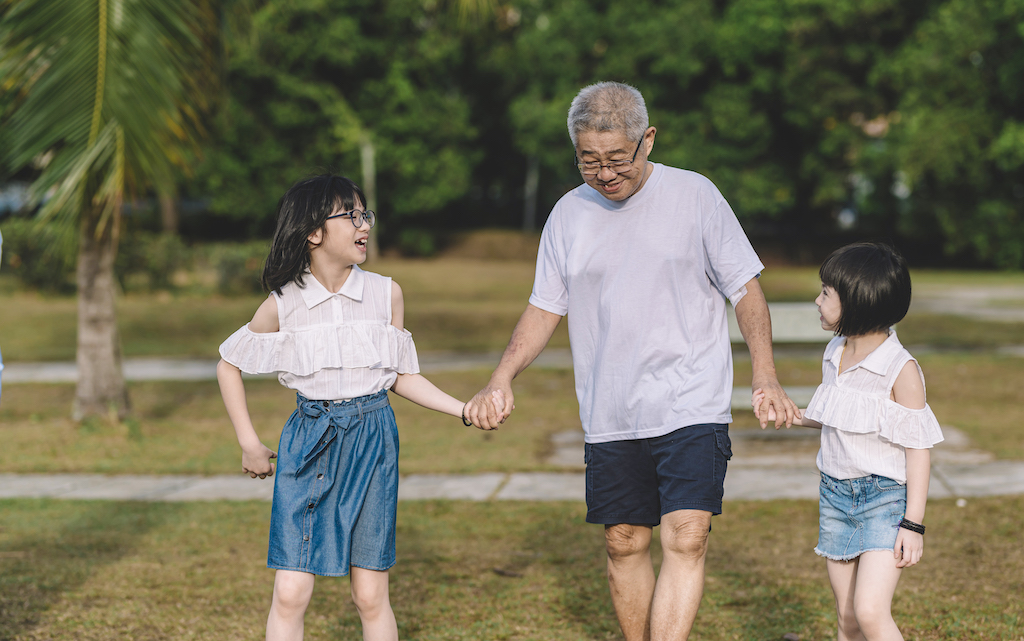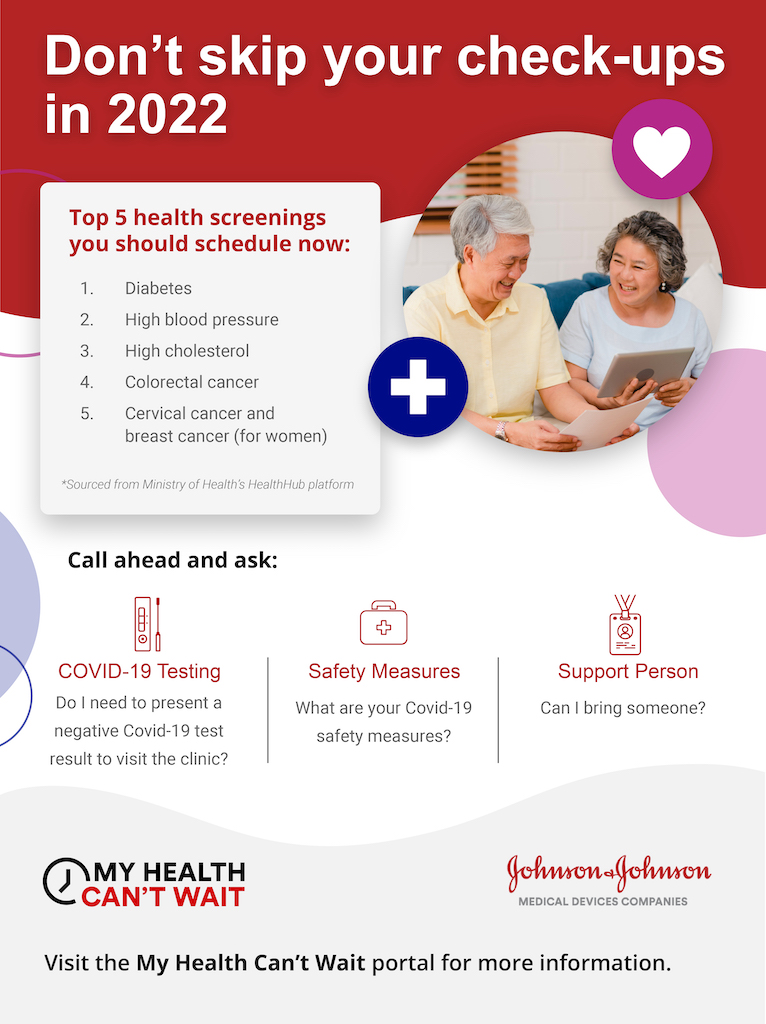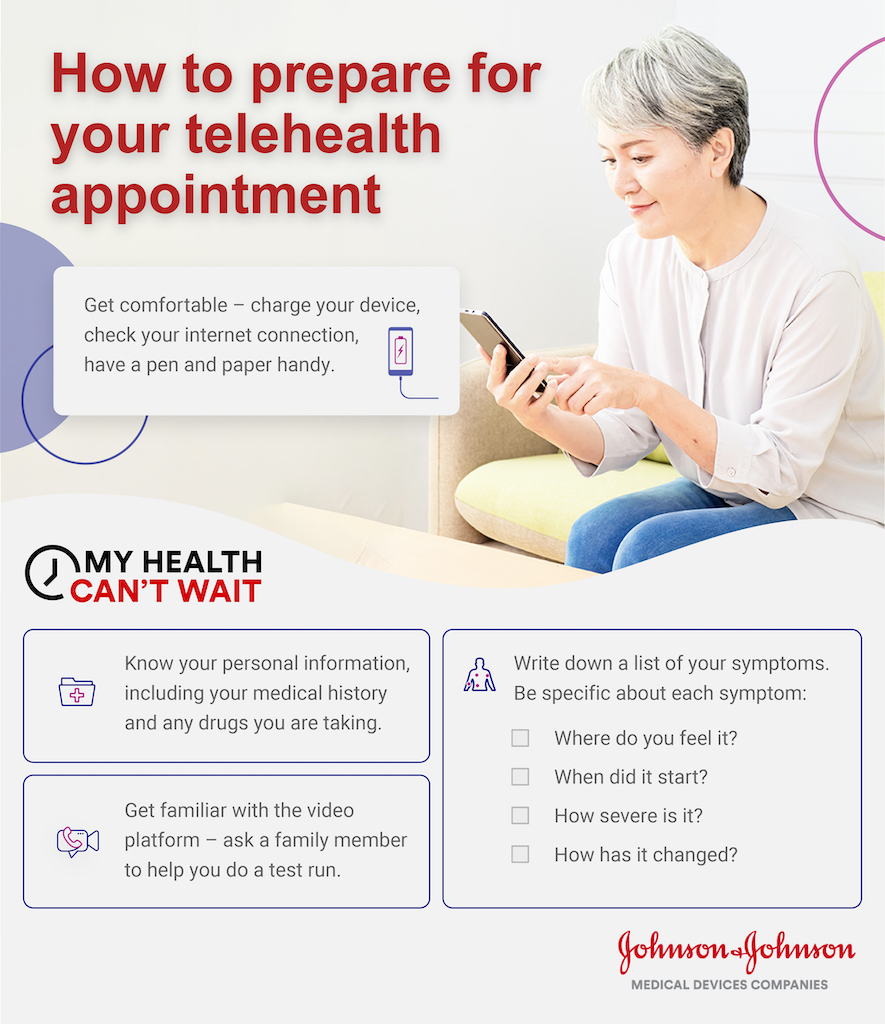Don’t defer your health check-ups this year
With the pandemic, seniors around the world are more cautious and are staying at home. However, deferring or cancelling health screenings and regular check-ups may not be a good idea.

The Covid-19 pandemic has undoubtedly seen higher caution on health risks to seniors around the world, and the advice to older members of our population has been to stay home as much as possible.
But this may have come with even more adverse health outcomes for seniors, as high numbers defer or cancel their health screenings and regular check-ups to minimise exposure to the virus at clinics and hospitals.
Research commissioned by Johnson & Johnson Medical Devices in Japan for their My Health Can’t Wait campaign, found that 40 percent of patients did not go for their health check-ups due to fears of contracting Covid-19. But unbeknownst to many is that other health conditions could equally, if not more severely, impact their health if treatment is delayed or missed. Take for instance cancer – where the number of deaths from cancer in Japan is 45 times greater than those from Covid-19.
A similar study in Australia found that almost half the respondents (49.1 percent) had delayed or cancelled their healthcare appointments, and that one in four Australians (24.6 percent) felt their health had worsened since the start of the pandemic.
Don’t ignore symptoms and delay action
Doctors globally have expressed collective concern at the high numbers of people deferring their health checks, especially as Covid-19 presents an even higher risk to people who are already battling pre-existing conditions. The US Centers for Disease Control and Prevention (CDC) lists cancer, chronic kidney, liver and lung disease, diabetes, dementia and heart conditions among the risk-factors causing serious illness and death from Covid-19.
Closer to home, like many developed countries, cancer is one of the leading causes of death in Singapore, alongside pneumonia and heart disease, accounting for 25 percent of total deaths among the elderly in this nation. A recent study by the medical journal BMJ found that delaying cancer treatment by even one month, due to a late diagnosis or deferring treatment, increased mortality risk by between six to 13 percent.
Atrial fibrillation (AFib) is another growing epidemic silently affecting millions of lives which can lead to serious consequences including disruptions to quality of life and increased risk of mortality. Studies place AFib as the most common sustained arrhythmia with global prevalence estimations at 46.3 million. In Asia-Pacific, the estimated number of AFib patients is expected to reach 72 million by 2025. Furthermore, the risk of suffering from this condition may go unnoticed due to lack of symptoms or mistaking them to be general fatigue, anxiety and shortness of breath. Thus, it is important to be educated on AFib’s warning signs and possible risk factors as well as attend regular screenings to monitor one’s heart health.

Misinformation & missed diagnoses
While sheltering at home, many have turned to the Internet, relying on medical websites and medical journals for self-diagnosis, instead of going to a doctor. This could lead to users landing on fake news sites peddling supplements that inaccurately claim to address their symptoms.
To help people determine the accuracy of information they are finding online, Johnson & Johnson Medical Devices has put together a quick guide to help identify medical misinformation. It notes that peer-reviewed scientific journals or reputable sources like the CDC are more trustworthy than anecdotal stories and anything linking to a sales platform.
The bottom line is that everyone should discuss any alternative therapies they’re considering with their doctor.
Telehealth – a way to stay on top of your check-ups from the comfort of home
Although telehealth consultations have become more common since the pandemic, video consultations still pose limitations among seniors for whom technology may be a barrier.
A 2020 survey by the Singapore Eye Research Institute found the elderly had low levels of acceptance of digital health services, with 78 percent of respondents saying they were uncomfortable with AI interpreting their medical results and providing automatic advice. However, one in four respondents was more likely to schedule a surgery or medical procedure if they were given the choice of using telehealth to stay connected with their healthcare provider.
The My Health Can’t Wait portal by Johnson & Johnson Medical Devices aims to make telehealth consultations a less alienating experience, by offering checklists aimed at helping patients and their family members prepare for their telehealth screenings.


0 Comments